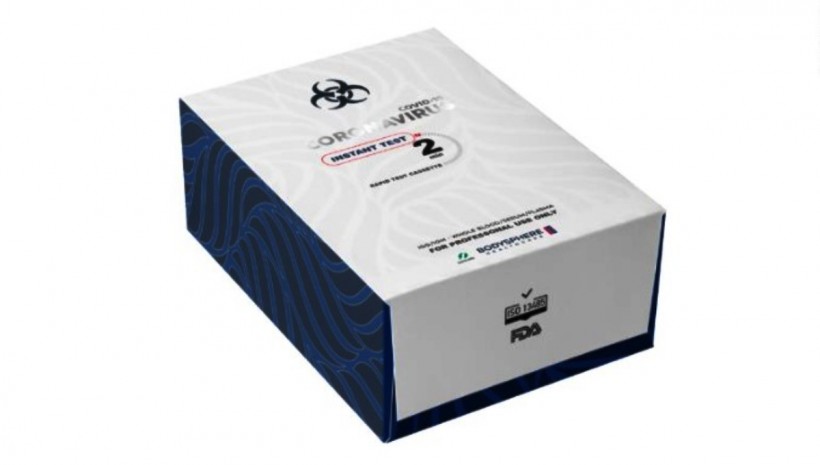COVID-19 Scams: Fake Tests, Insurance Scams, and Extortion Schemes
Fraudulent schemes and conmen are taking advantage of the COVID-19 crisis to prey on unknowing individuals, especially elderly and vulnerable people, using fake testing kits, vaccines, investment scams, and more.
Fake Test
 (Photo : Bodysphere)
(Photo : Bodysphere)

A company named Bodysphere claimed it would begin distributing its two-minute coronavirus test that promises to detect current and past infections by analyzing antibodies from patients.
The company said it had received an Emergency Use Authorization for its serology test on Tuesday.
On Thursday, they announced plans to deliver more than a million FDA-approved test kits within weeks, saying their two-minute antibody test was "a game-changer." Bodysphere published a photo of the test, including the FDA logo.
Multiple news outlets reported the announcement soon after.
The company's claim, however, has been refuted by the US Food and Drug Administration. Michael Felberbaum, an FDA spokesperson, clarified only Cellex Inc.'s antibody test was permitted to test for coronavirus.
D'Anne Mica, a Bodysphere spokesperson, initially maintained its authorization claim. She later acknowledged the FDA's statement and said, "There was a misunderstanding."
Charlton Lui, Bodysphere's CEO, said his company "mistakenly believed" they were given authorization and blamed a misunderstanding of paperwork.
Test Schemes
A 49-year-old man from Georgia was recently caught after running a scheme where he earned kickbacks for referring patients to various medical testing facilities.
According to court documents, Erik Santos had been running the scheme for more than a year before the coronavirus outbreak. He reportedly arranged to be paid kickbacks for every COVID-19 test performed on individuals he referred. He would receive more should the test include other expensive respiratory examinations.
In Kentucky, authorities foiled multiple "drive-up test sites" promising to deliver accurate results within the day for $250. The testing sites were scattered across Louisville, including one at a gas station.
A spokeswoman for the mayor's office said they had received multiple calls about the pop-up testing sites. Investigators are reviewing the case.
Law enforcement workers also won a restraining order against the operator of a Texas-based website coronavirusmedicalkit.com for offering a "vaccine" for the virus.
The website, which has since been taken down, reportedly published a $4.95 vaccine kits they say were approved by the World Health Organization. The website allegedly included a photograph of Dr. Anthony Fauci, White House's infectious disease expert, in a bid to promote the false vaccine.
Email Scams
The FBI warned the public to avoid opening unsolicited and suspicious emails as phishing scams and extortion schemes are on the rise.
An internet security company, Sophos, recently uncovered a coronavirus-related extortion scam where fraudsters would blackmail people into paying over $4,000 in exchange for their family's safety. The fraudsters would then threaten unsuspecting victims to pay via bitcoin or risk getting "every member of the family infected with COVID-19."
Other email scams involve criminals impersonating the World Health Organization and other federal agencies to get victims to download and open "health advice" attachments. The attacker would then obtain sensitive information that could be used to steal funds.
The US Department of Education released a warning about an email asking for bank details from parents so their children would be eligible for free school meals despite the ongoing school closures.
Experts say the scams are likely to continue, with criminals taking advantage of the global pandemic to exploit financial concerns and pensions.
Authorities urge the public to take extra precautions before accepting unsolicited emails, texts, calls, and "visitors." Making sure your gadgets are supported by updated security and antivirus software can also help minimize fraudulent threats.
Subscribe to Latin Post!
Sign up for our free newsletter for the Latest coverage!














